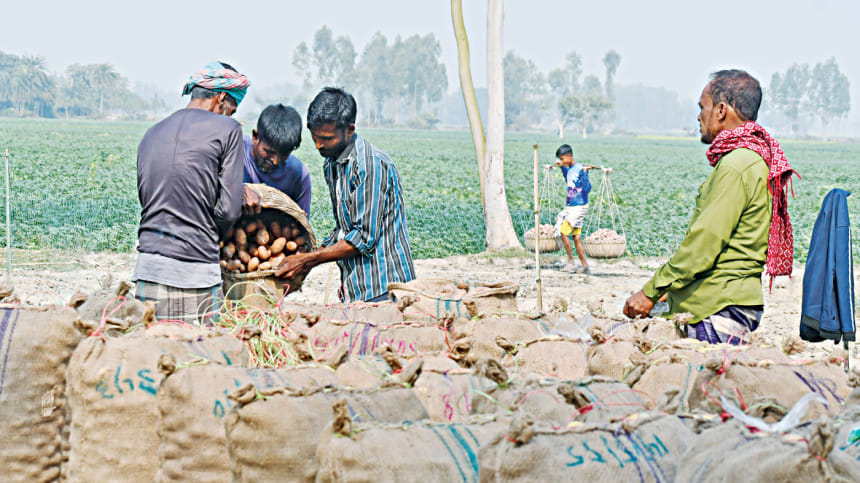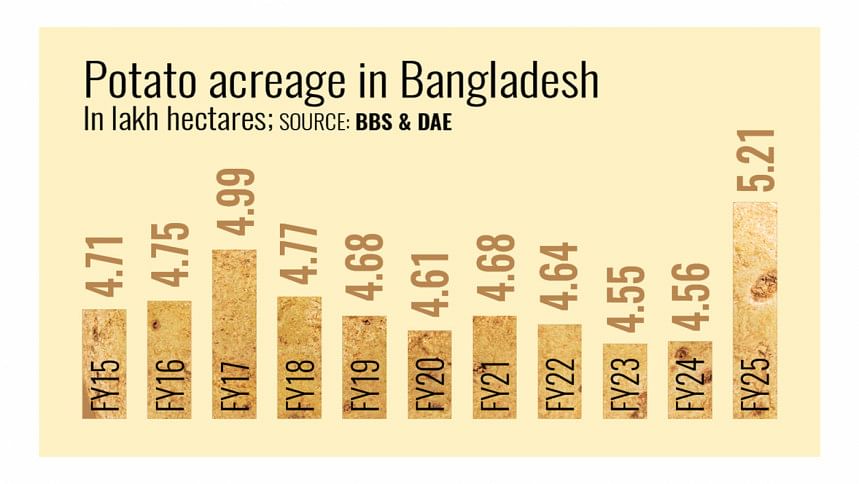Potato growers at risk of huge losses as prices dip

Potato acreage in Bangladesh increased to a record high of 5.21 lakh hectares this year, but growers are apprehensive about a significant financial setback due to falling prices of the popular vegetable.
Over the last month, retail prices of potatoes—grown by tens of thousands of farmers as a high-value crop—have nearly halved.
Each kilogram (kg) sold for Tk 30-Tk 50 in Dhaka yesterday, whereas it was Tk 65–Tk 80 around a month ago, according to the Trading Corporation of Bangladesh (TCB).
At the growers' level in various northern districts, potatoes are being sold at Tk 12-Tk 20 per kg, with farmers fearing further price drops once full-scale harvests begin.
As of yesterday, only 3 percent of the crop had been harvested, according to data from the Department of Agricultural Extension (DAE).
Anything below Tk 20 per kg will result in losses for farmers, said Md Matiar Rahman, director of the Tuber Crop Research Centre under the Bangladesh Agricultural Research Institute (BARI).

He noted that growers expanded acreage this season, encouraged by last year's high prices.
Data from the DAE and the Bangladesh Bureau of Statistics show that the vegetable's cultivation reached its highest level in the fiscal year 2024-25, with the acreage increasing by 14 percent year-on-year from 4.57 lakh hectares in FY24.
"Many farmers switched from mustard to potatoes. Overall production is likely to be higher this year due to increased acreage and favourable weather," Rahman said.
Farmers and DAE field offices in some northern districts estimate that the cost of production has risen this year.
In Bogura, farmers estimate that it cost Tk 14.50 to produce each kg, up by Tk 1 from a year ago. Thus, the cost per bigha (33 decimals of land) stands at Tk 41,000 this year.
In five districts of Rangpur, the production cost is over Tk 15 per kg, according to the DAE Rangpur region office.
"We cultivated potatoes while facing many hurdles. We had to buy seeds at almost double the prices paid last season," said Abdur Rouf, a farmer from Gaibandha's Gobindaganj upazila.
"There was also a significant shortage of triple superphosphate fertiliser, forcing me to spend more to obtain it," he said.
Usually, planting for early harvests takes place in the last week of September, with harvesting in late November. However, this season's planting was delayed due to untimely rainfall in September and October.
Many farmers had to replant as heavy rains damaged fields in Rangpur.
Dulu Mia, another farmer from Gaibandha, spent Tk 39,600 on one bigha of land and harvested about 50 maunds. He sold the crop for Tk 42,500, earning Tk 850 per maund.
"Even after early harvesting, I could barely recover my investment. What will happen during the full harvest season? I am deeply worried," he said.
Amzad Hossain, a 50-year-old farmer from Thakurgaon, said his cost was Tk 13 per kg, which was significantly higher than his selling price.
Lutfar Rahman, another farmer from Thakurgaon's Baliadangi upazila, shared similar concerns.
In Dinajpur's Biral upazila, farmer Satyan Roy said his production cost per kg was over Tk 23, but he was forced to sell at Tk 20.
Rubel Ahmed, a first-time potato farmer from Shibganj, Bogura, leased two bighas of land, investing Tk 120,000.
"Potato prices were good over the past two years, but the current price drop is alarming. I fear a massive loss," he said.
Afzal Hossain, deputy director of the Rangpur DAE office, remarked, "This year, farmers planted table potatoes even after seed potatoes were finished."
"Potato cultivation increased significantly due to expectations of higher profits. Sometimes, farmers ignore our advice," he said.
FARMERS FACE HIGHER STORAGE COSTS
Besides high production costs and falling prices, storage costs are another concern. Cold storages have increased rent for storing potatoes.
The Bangladesh Cold Storage Association (BCSA) announced that storage charges would be Tk 8 per kg this year, up from Tk 7 last year, said BCSA President Mostofa Azad Chowdhury Babu.
"The interest rate on loans taken by cold storage owners has risen to 15 percent. If payments are delayed, we incur a penalty of 2 percent. This is why storage charges have increased," he explained.
FARMERS URGE EXPORTS
Agricultural officials and farmers anticipate a bumper yield this year due to favourable weather. In light of this, they urged the government to facilitate exports to reduce their losses.
Data from the Bangladesh Bureau of Statistics (BBS) showed that Bangladesh produced 1.06 crore tonnes in FY24, an increase of 1.62 percent year-on-year. The country also imported potatoes to meet deficits.
According to the DAE officials, annual demand stands at about 90 lakh tonnes, while production this year is expected to exceed that of the previous year.
As cold storages under the BCSA can hold roughly 45 lakh tonnes, a significant portion of the yield may remain unsold, forcing farmers to sell at a loss.
Sirajul Islam, deputy director of the DAE in Thakurgaon, noted that the weather conditions this year were better than last year.
"If the favourable weather continues for another 15–20 days, farmers will achieve a bumper yield," he said.
BARI's Rahman concluded that Bangladesh might not need to import potatoes this year due to the increase in production.

 For all latest news, follow The Daily Star's Google News channel.
For all latest news, follow The Daily Star's Google News channel. 



Comments